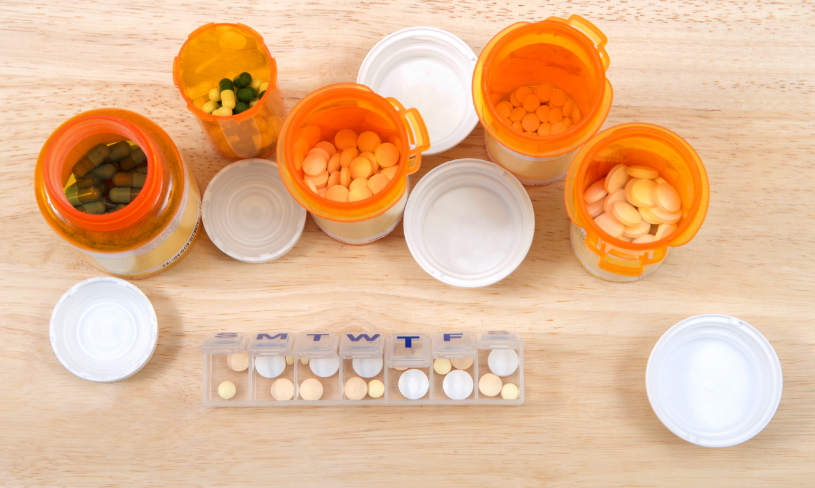
The way people use drugs affects the whole system. No matter how short or long these drugs are taken, expect that there would be direct drug effects such as health complications and indirect drug effects such as relationship changes. Moreover, aside from the frequency of use, the severity of the effects of drugs depends on the dose, administration, pre-existing health condition of the patient, and other factors that affect the development of addiction in the brain and cause other health problems.
Table Of Contents:
In 2019, around 275 million people globally are reported to be abusing illegal drugs, and 36.3% of these people are considered to be addicts. With these statistics, it is necessary to know what are the effects of drug addiction and abuse on the physical and mental health of an individual.
In this article, information about effects of drug addiction, short-term and long-term effects of abuse, the effects of drugs on different systems of the body, and how to treat drug abuse and addiction in a proper and safe way will be provided.
Effects of Drug Abuse
A patient abusing a certain drug may experience drug effects, and these effects may be short-term or long-term. Moreover, either of the two, take note that these effects of drug abuse and addiction may cause complications to both the physical and psychological health of the patient. According to the Department of Health, each psychoactive drug being taken by a patient often has common and short-term drug effects on behavior and body functions.
Short-Term Physical Effects Of Drug Abuse
When a patient abuses any drug or substance like alcohol in a single-use, the tendency that physical changes may be observed is very high. In terms of the physical effects of drug abuse, take a look at the information below:
- Opioid Drugs: According to a study published in Cambridge University Press, the physical effects of drug abuse on opioid drugs such as Oxycodone, Hydrocodone, and Morphine include constipation, nausea, and shallow breathing.
- Stimulants: Abuse in the use of stimulants such as Nicotine and Adderall may also produce short-term physical side effects. According to a study of medical doctors from Rhode Island, the physical effects of drug abuse on stimulants include increased blood pressure and alertness.
- Diet Pills: Even the abuse of diet pills such as Phentermine may produce short-term physical adverse reactions. Some of the side effects of drug abuse on these diet pills include chest pain, high blood pressure, decreased libido, and menstrual cycle irregularities.
According to a study of medical doctors from the UK, the common physical short-term effects of addiction and abuse of drugs focus on cardiovascular health. Although these drug effects are only temporary, seeking emergency medical help as soon as the patient experiences any of the side effects of addiction may prevent serious health dangers.
Short-Term Psychological Effects of Drug Abuse
Take note that drugs are also mind-altering. According to a study of a medical doctor from Pennsylvania, aside from the physical short-term effects of substance abuse, people with substance use disorder may also experience short-term psychological effects. Some of the drugs that may produce these short-term adverse reactions include the following:
- Anabolic Steroids: Drugs such as Nandrolone are commonly used by athletes to improve their body functions. According to a study published in the Current Neuropharmacology, the side effects of drug abuse on anabolic steroids include short-term hypomania, trouble focusing, agitation, and insomnia.
- Medications for Addiction:Take note that even the drugs patients use to manage their addiction may cause short-term psychological effects. According to a study published in the Journal of Jefferson Psychiatry, the effects of addiction on medications that are used to treat the condition itself include mania and insomnia that would eventually improve over the first week of use of the drugs. Some of these medications include Wellbutrin, Naltrexone, and Gabapentin.
Barbiturates: Drugs such as Phenobarbital and Fiorinal are also potential drugs that may cause short-term psychological adverse reactions. Some of the side effects of drug abuse on barbiturates include dizziness, lightheadedness, and drowsiness.
Drug abuse does not simply mean that one patient has taken a medication longer than prescribed. It also means that a patient has taken more than the dose required even if it has only been used one time.
Long-Term Effects Of Drug Abuse
Moving on with the long-term effects of substance abuse, it is safe to say that this does not only focus on what is common. Instead, this also speaks about damages to the organs in the body, especially the liver and the brain. Also, the long-term effects of drug abuse may also be associated with the occurrence of health diseases and illnesses such as cancer.
Long-Term Physical Effects of Drug Abuse
When a patient starts to abuse the use of a drug, this can lead to tolerance. Eventually, this tolerance would cause not only overdose but physical damages as well. Some of the drugs that may cause long-term physical effects when abused include the following:
- Cocaine: This substance is a highly addictive powder that is also considered a stimulant and it causes long-term damage to physical health. Physical effects of drug abuse on cocaine include respiratory failure, heart attack, and stroke.
- Kava: Also known as Kava Kava, the substance derived from a native plant called Piper methysticum is also a drug that may potentially cause long-term physical side effects. According to the FDA, the effects of drug abuse on Kava are liver-related injuries such as cirrhosis, hepatitis, and liver failure, and based on the 25 patients who reported adverse hepatic reactions, 4 of these had to undergo a liver transplant.
- Gamma-hydroxybutyrate: Gamma-hydroxybutyrate, a psychoactive drug also known as GHB, is also reported to cause physical long-term effects. According to a study published in Molecular Pharmacology, side effects of drug abuse in the use of this substance include to the lungs, causing a respiratory collapse of depression.
Since the effects of substance abuse may cause irreversible damages to the organs in the body, it is advised to strictly follow the instruction of a medical doctor. As much as possible, avoid consuming drugs for recreational purposes in order to avoid other dangers to the health.
Psychological Effects of Drug Abuse
This time, speaking of the long-term psychological effects of addiction and abuse of drugs, the focus would be on the brain damages a certain drug can cause. When a brain is injured, the functions of the brain would also be altered because of mental deficiency or subnormality.
Some of the Drugs That Cause Long-Term Psychological Effects When Abused Include the Following:
- Phencyclidine: Also known as PCP, this substance may cause changes to the structures of the brain. According to a study of medical doctors from the USA, even an acute use of Phencyclidine can already cause neurochemical changes that could eventually lead to memory problems, trouble with concentration and perception, and impaired judgment.
- Methamphetamine: Also considered as a stimulant drug, Methamphetamine may cause long-term psychological effects when abused. Aside from confusion and violent behaviors, this drug may cause irreversible damage to the blood vessels in the brain.
- Lysergic Acid Diethylamide: Also known as LSD, this hallucinogenic drug may cause bad trips. According to a study of medical doctors from India, although these “trips” may only last up to 24 hours, they could lead to long-lasting psychoses such as schizophrenia and severe depression.
Aside from the physical and psychological effects of drug addiction and abuse, understand that it can also cause relationship and personal life changes. According to a study, a person with substance abuse disorder may experience family problems, and one of the best ways to move forward is by considering an early drug intervention.

Effects of Drugs on The Body Systems
When a certain medication is consumed, expect that other body systems will also be affected. It does not mean that a drug for the heart would only affect the cardiovascular system. For example, the drug Clonidine is known to manage hypertension. However, this substance may also cause behavioral effects.
How Do Drugs Affect the Brain
In the brain, there are neurons. These are responsible for transmitting information to other nerve cells and muscles. Also, neurons aid in the release of neurotransmitters. So, when medications are consumed, the effects of drugs will be an alteration of the function of the neurons. This alteration will either enhance or interfere with the activity of the neurotransmitters and receptors in the synapses of the brain. According to Principles of Addiction and Law, aside from alcohol, psychoactive substances that affect the neurotransmitters dopamine are the most common drugs that affect the brain. Some of these psychoactive substances include Heroin, methamphetamine, and cocaine.
How Do Drugs Affect the Heart
How do drugs affect the heart? Medications affect the heart by causing changes in blood pressure, heart rate, and pulse rate. According to the American Heart Association, illegal drugs may affect the heart, and the most dangerous one is the cocaine substance. Furthermore, according to the Journal of the American College of Cardiology, drug-induced heart failure may also be caused by antidepressant drugs. Some of these include tricyclic antidepressants (TCAs), Selective Serotonin Reuptake Inhibitors (SSRIs), and Monoamine Oxidase Inhibitors (MAOIs).
What Drugs Can Cause Difficulty Breathing?
The most common drugs that cause difficulty of breathing are non-steroidal anti-inflammatory drugs (NSAIDs). Although these medications are effective analgesic and antipyretic drugs, they can cause drug-induced bronchospasm. Some examples of these NSAIDs include the drug Naproxen. In another study by doctors from the USA, it was also reported that long-term use of barbiturates such as Phenobarbital may also cause difficulty of breathing. Therefore, the respiratory health of patients being treated using these medications must always be monitored.
What Medications Can Cause Liver Damage?
What drugs cause liver damage? According to the cohort study of physicians from Australia, it was reported that the cause of liver failure in 225 out of 308 patients is the use of the drug Acetaminophen, which is used to relieve fever or pains and aches. In the same study, 29% of these patients had to undergo a liver transplant in order to survive. For this reason, patients who are using Acetaminophen must never use the drug for a long period of time as this may cause an overdose that can cause irreversible liver damage. Also, it is important to remember to never combine Acetaminophen and alcohol, as aside from liver damage, this combination may cause bleeding, ulcers, and kidney failure.
What Medications Can Damage Your Kidneys?
What is bad for your kidneys? According to the National Institute of Diabetes and Digestive and Kidney Diseases, over-the-counter medications for pain are likely to cause damage to the kidneys. Some examples of these OTC pain medications include Naproxen and Ibuprofen. Therefore, if the patient has a Chronic Kidney Disease (CKD), it is a must to ask a medical professional about the drug that is safe to be concomitantly used with the health condition.

Effects of Drugs on Sex Drive and Fertility?
There are also possible effects of drugs on the reproductive system. According to a study of doctors from Ireland, it was reported that the drug class Selective Serotonin Reuptake Inhibitors (SSRIs) produces the highest effects on sex drive and fertility, with a prevalence rate of 73% compared to other antidepressant drugs. Examples of these drugs include Zoloft, Celexa, and Lexapro. Furthermore, comparing the SSRI drugs, it was found out that the medication Paroxetine has the highest rate of producing sexual dysfunction and reduced fertility, with a prevalence rate of 75.5%. In case a patient using these drugs is planning to get pregnant, antidepressant alternatives may be considered in the direction of a medical doctor. On the other hand there are also some drugs that increase sex drive.
Other Effects of Drugs
Take note that there are also effects of drugs that do not directly affect the organs in the system, such as drugs that affect the physical appearance of a person and drugs that can affect pregnancy. To understand more, take a look at the information below:
- Drugs that cause weight loss: while weight loss can be beneficial for some patients, especially for those who are obese, some drugs that may have this side effect include Cymbalta, Naltrexone, Prozac, and Effexor.
- Drugs that cause hair loss: Although this side effect is unwanted, there are some antidepressants that may cause hair loss, and the most prominent ones are the drugs Wellbutrin and Pristiq.
- Drugs that affect pregnancy and breastfeeding: There are also effects of drugs on pregnancy. Therefore, a pregnant patient must take note of the medications that are contraindicated during pregnancy or when a patient is breastfeeding. The drugs that should be avoided at all costs during this precious time of pregnancy include Buspirone, Naproxen, Venlafaxine, and Dextromethorphan.
Since most drugs cause adverse effects, the best way to prevent experiencing one is by avoiding doing self-medication, especially when the patient has pre-existing health conditions, including pregnancy. Asking advice from a medical doctor would be helpful in getting the right medication for the patient.
What Is Drug Addiction?
Some may be wondering, how does addiction work? To answer this, it is important to first understand the meaning of drug addiction. Drug addiction is a condition that occurs when a patient is having a hard time stopping the use of a substance. Since there is also alcohol addiction, take note that addiction is not only associated with illegal drugs but also with common medications, especially those that are used for the treatment of mental health conditions, such as antidepressants.
Other Mental Health Drugs Include the Following:
So, how does addiction work in people? Usually, people get addicted when medication comes with dependence property. This is a characteristic of a drug that makes the body seek it even when it is no longer needed. Moreover, it was reported that the most abused illegal drug in 2019 is cannabis, with a statistic of 200 million users globally.
Some Other Illicit Drugs That May Cause Addiction Include the Following:
Since there is a wide range of drugs that may cause abuse and addiction, the best way to prevent this is by strictly following a doctor’s prescription and avoiding substances that are not prescribed. In case a patient is having trouble quitting the use of a certain substance, addiction treatment would be of great help.

Drug Addiction And Abuse Treatment Options
Indeed, addiction is still prevalent in society today, and the effects of drug addiction and abuse produce short-term and long-term effects on both the physical and mental health of a person. In the worst case, irreversible damages to the body organs may also happen. Fortunately, there is hope for those who want to quit drug addiction and abuse, and this is through the help of resources. Although addiction recovery might not be as easy as it seems, with the help of addiction specialists, successful recovery awaits.
Furthermore, patients who want to undergo drug addiction and abuse treatment may consider getting involved with narcotics anonymous meetings. Since there is still a global epidemic, addiction treatment during this time of the COVID-19 pandemic is still possible as there are online NA meetings as well. Surely, with these treatment options, abuse and addiction relapse can be prevented.
Hope Without Commitment
Find the best treatment options. Call our free and confidential helpline
Most private insurances accepted
Related Topics
- Drugs Effects on Heart
- Drugs Effects on Liver
- Drugs Effects on Kidneys
- Drugs Effects on Brain
- Drugs Effects on Hypersexuality
- Drugs Effects on Lungs
Find Drug Rehabilitation Centers Near You Anywhere In the US
Addiction Resource team has compiled an extensive list of the top drug rehabilitation facilities around the country. Use our locator tool to find the best centers near you.
Page Sources
- Coomber, K., Mayshak, R., Curtis, A., & Miller, P. G. (2017). Awareness and correlates of short-term and long-term consequences of alcohol use among Australian drinkers. Australian and New Zealand journal of public health, 41(3), 237-242.
- Das, S., Barnwal, P., Ramasamy, A., Sen, S., & Mondal, S. (2016). Lysergic acid diethylamide: a drug of ‘use’?. Therapeutic advances in psychopharmacology, 6(3), 214-228.
- Eddy, N. B., Halbach, H., Isbell, H., & Seevers, M. H. (1965). Drug dependence: its significance and characteristics. Bulletin of the World Health Organization, 32(5), 721.
- Feenstra, J., Grobbee, D. E., Remme, W. J., & Stricker, B. H. C. (1999). Drug-induced heart failure. Journal of the American College of Cardiology, 33(5), 1152-1162.
- Fu, P. P., Xia, Q., Guo, L., Yu, H., & Chan, P. C. (2008). Toxicity of kava kava. Journal of Environmental Science and Health Part C, 26(1), 89-112.
- Greer, R. A., & Gold, M. S. (2010). Pharmacological Drug Effects on Brain and Behavior. In Principles of Addictions and the Law (pp. 177-192). Academic Press.
- Higgins, A., Nash, M., & Lynch, A. M. (2010). Antidepressant-associated sexual dysfunction: impact, effects, and treatment. Drug, healthcare and patient safety, 2, 141.
- Iltis, I., Koski, D. M., Eberly, L. E., Nelson, C. D., Deelchand, D. K., Valette, J., ... & Henry, P. G. (2009). Neurochemical changes in the rat prefrontal cortex following acute phencyclidine treatment: an in vivo localized 1H MRS study. NMR in Biomedicine: An International Journal Devoted to the Development and Application of Magnetic Resonance In vivo, 22(7), 737-744.
- Jing, E., & Straw-Wilson, K. (2016). Sexual dysfunction in selective serotonin reuptake inhibitors (SSRIs) and potential solutions: A narrative literature review. Mental Health Clinician, 6(4), 191-196.
- Ostapowicz, G., Fontana, R. J., Schiødt, F. V., Larson, A., Davern, T. J., Han, S. H., ... & Lee, W. M. (2002). Results of a prospective study of acute liver failure at 17 tertiary care centers in the United States. Annals of internal medicine, 137(12), 947-954.
- Piacentino, Daria, Georgios D Kotzalidis, Antonio Del Casale, Maria Rosaria Aromatario, Cristoforo Pomara, Paolo Girardi, and Gabriele Sani. "Anabolic-androgenic steroid use and psychopathology in athletes. A systematic review." Current neuropharmacology 13, no. 1 (2015): 101-121.
- Sturtevant, J. (1999). NSAID-induced bronchospasm--a common and serious problem. A report from MEDSAFE, the New Zealand Medicines and Medical Devices Safety Authority. The New Zealand Dental Journal, 95(421), 84-84.


 Reviewed by:
Reviewed by:  Written by:
Written by: 

 FindTreatment.gov
FindTreatment.gov